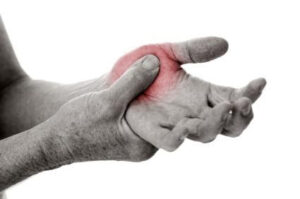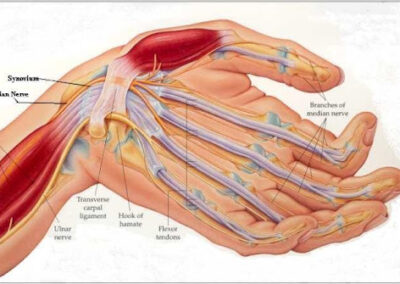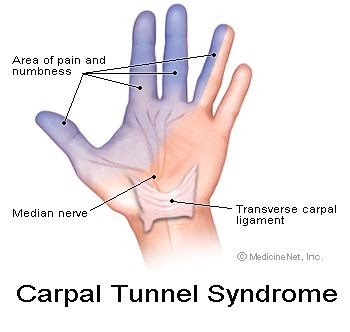The two main nerves that control the muscles of the hands are the median and ulnar nerves. Each of these nerves passes through a “tunnel” of connective tissue at the wrist before it enters the hand. Carpal Tunnel Syndrome (CTS), the most common form of nerve entrapment, occurs when the median nerve gets pinched or compressed at the wrist. This often results in pain and numbness in the thumb, index and middle finger. Sometimes patients may feel like their “whole hand” is numb or the pain may travel into the arm. People often state their hands “feel swollen”, cold or numb. They may frequently drop objects. If the condition goes untreated, some of the muscles of the hand may begin to atrophy / shrink.
Carpal Tunnel Syndrome often causes:

- Numbness and tingling in the hand and fingers
- Hand weakness
- Muscle atrophy
- Difficulty buttoning clothes or picking things up
- People to “shake out” their hands at night
- Dropping objects
- Hands and that feel swollen
- Numbness with driving
- Hand and arm pain
Who is at risk of developing carpal tunnel syndrome?
Women are more likely to develop carpal tunnel syndrome than men, possibly because the size of the tunnel in the wrist may be smaller. People who perform repetitive activity such as assembly line work are generally more at risk than those who work on computers. Symptoms are usually worse in the dominant hand. People with metabolic problems, such as diabetes, are more prone to nerve injury. Fluid retention during pregnancy often results in hand and wrist discomfort. Some people may also have a genetic predisposition which affects the ability of their nerves to tolerate compression.
How is carpal tunnel syndrome diagnosed?
A thorough history and clinical exam are the best way to screen for nerve injury. In some cases, special testing such as EMG/NCV tests are required to help determine where the exact location of the nerve entrapment is, and how severe it is. In rare cases, the median nerve can become trapped at the elbow instead of the wrist. A common situation that may mimic carpal tunnel syndrome is a pinched nerve in the neck. Proper testing not only helps to determine where the problem is, but also prevents unnecessary treatment to other areas.
How is carpal tunnel syndrome treated?
Mild cases of carpal tunnel syndrome often respond to a trial of wrist splinting at bedtime for a couple of weeks. More severe cases may respond to injections or surgery.
If you are one of the many people suffering from neck pain, chronic lower back pain, scoliosis, sciatica or another spine-related condition, you will be in great hands at Connecticut Back Center (CBC). CBC was founded by Jesse Eisler, MD, PhD, in 2005 and with offices in Vernon and Bloomfield, CT serves the Greater Hartford and Central Connecticut area. Our mission is to provide accurate, responsive and effective spinal care with comprehensive non-surgical and surgical treatments for the full spectrum of spinal disorders. Our goal is always to reduce your pain, increase your flexibility and help you resume an active life after treatment. To learn more about your treatment options, give us a call at (860) 253-2714 or request an appointment online now.



